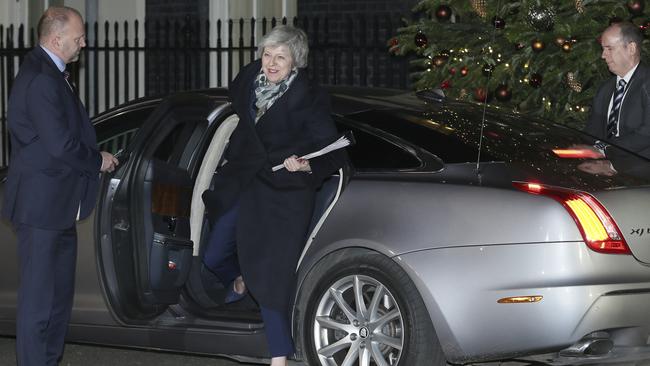Theresa May can’t count on EU Brexit lifeline
European commissions will step up preparations in case the UK crashes out of the EU next March without a deal.

The European Commission will step up preparations in case Britain crashes out of the EU next March without a deal, president Jean-Claude Juncker has said after summit talks in Brussels.
Mr Junker said he would publish on December 19 “all the information that is generally useful for the preparation of no deal”.
He spoke after a bruised Theresa May headed to Brussels, after prevailing in a no-confidence vote in Westminster. As the EU prepared to dash her hopes of making legal changes to the Irish “backstop” to save her Brexit deal, Mrs May met empathetic European leaders to tinker with the Irish border arrangement to reassure her restive MPs.
But after the meetins, Mr Junker said the British PM had failed to bring a clear plan for how the EU should help her get her contentious Brexit deal past the British parliament.
The British “still need to say what they want instead of asking us what we want,” Mr Junker told reporters.Joking that it was sometimes tought to fathom his own state of mind, he said: “It’s even harder to understand the state of mind of the British” MPs.
EU negotiators have told journalists they will not allow any legally binding addendum or text to cut across the meaning of the deal already agreed upon.
Mrs May pledged not to stand as leader for the next general election as she fought a no-confidence motion by her Tory party politicians and later said she had listened to her colleagues.
With more than one-third of Tory MPs against her, nearly all of them Brexit Leavers, Mrs May had hoped a European change of mood would help her fight off accusations she was a lame-duck Prime Minister limping into oblivion.
“For my part, I have heard what the House of Commons said about the Northern Ireland backstop and when I go to the European Council, I will be seeking legal and political assurances that will assuage the concerns that members of parliament have on that issue,’’ she said.
Bureaucrats have said there would be some placatory language but nothing to change the substance of the deal.
Earlier this week, Ireland Prime Minister Leo Varadkar warned that there would be no renegotiation of the backstop without opening up all aspects. “It’s not possible to reopen any aspect of that agreement without opening all aspects of it,” he said.
Yet there is no political will by Mrs May, nor inside the European Council, to completely up-end the deal and make it palatable to the British parliament. Both sides of the Channel are fast-tracking no-deal plans.
The British public knows this and is fed up with the parliamentary wrangling.
Mrs May hasn’t tabled her Brexit deal on the parliamentary agenda before Christmas, indicating the vote will not happen until the new year. January 18 is believed to be the preferred day as it's the last working day before a procedural deadline of January 21.
Mrs May’s leadership victory did not make her Brexit headaches go away. In Britain, headlines screamed of a pyrrhic victory.
The Sun told the Prime Minister “Time to call it a May”, and The Telegraph, with Brexiteer Boris Johnson on its payroll, said: “A vote to Remain, but when will she Leave?”. The Mirror had “It’s lame duck for Christmas”, saying Mrs May’s “goose is cooked”, while the Daily Mail, under a new pro-May editor, said: “Now let her get on with the job!”
Polls show the exasperated public is highly sceptical that Mrs May has the flexibility or will to change the course that the EU had determined and Britain acquiesced to. Inside and outside Westminster, Mrs May is accused of just stalling for time so she can panic the parliamentarians into accepting her deal rather than leave Brexit without a deal. The contempt for parliamentarians on both sides of the house is palpable.
Labour is hollering for Mrs May to table the Brexit deal to parliament immediately. Based on the 117 votes against Mrs May in Wednesday night’s ballot, the Brexit deal has well over 300 opponents.
International Trade Secretary Liam Fox indicated that unless the deal was changed substantially, it would not pass cabinet approval to be put to a parliamentary vote.
If anything, Mrs May could soften the Brexit terms further as she survived the leadership vote only with the strong backing of her Remain-dominant cabinet.
Her desperation to cling to power was evident when she told the room of backbenchers before their decision-making that it wasn’t her intention to contest the next election, due in 2022.
Health Minister Matt Hancock said of that moment: “She said in her head she’d love to fight next election but she knows she can’t — she was quite emotional about that.’’
Scottish First Minister Nicola Sturgeon said Mrs May’s admitting to a limited time in office had fatally undermined her remaining authority. “This result is barely even a pyrrhic victory for the Prime Minister,’’ she said.
The pressure continues to escalate for a second referendum to break the Westminster deadlock.
Liberal Democrat leader Vince Cable said there was no more negotiating to do with the EU “ so it’s this deal or no Brexit’’.
“That is the choice on which every voter should now have a final say,’’ he said.
The split in the Conservative party is so deep there is discussion of the “nuclear option”, where some deeply concerned Tories may side with Labour on any confidence vote in the government.
This is because if successful, it would force the Tories to change the leadership — and direction — of Brexit negotiations. Under the Fixed Term Act, the government has 14 days to find another leader that commands the confidence of the house.



